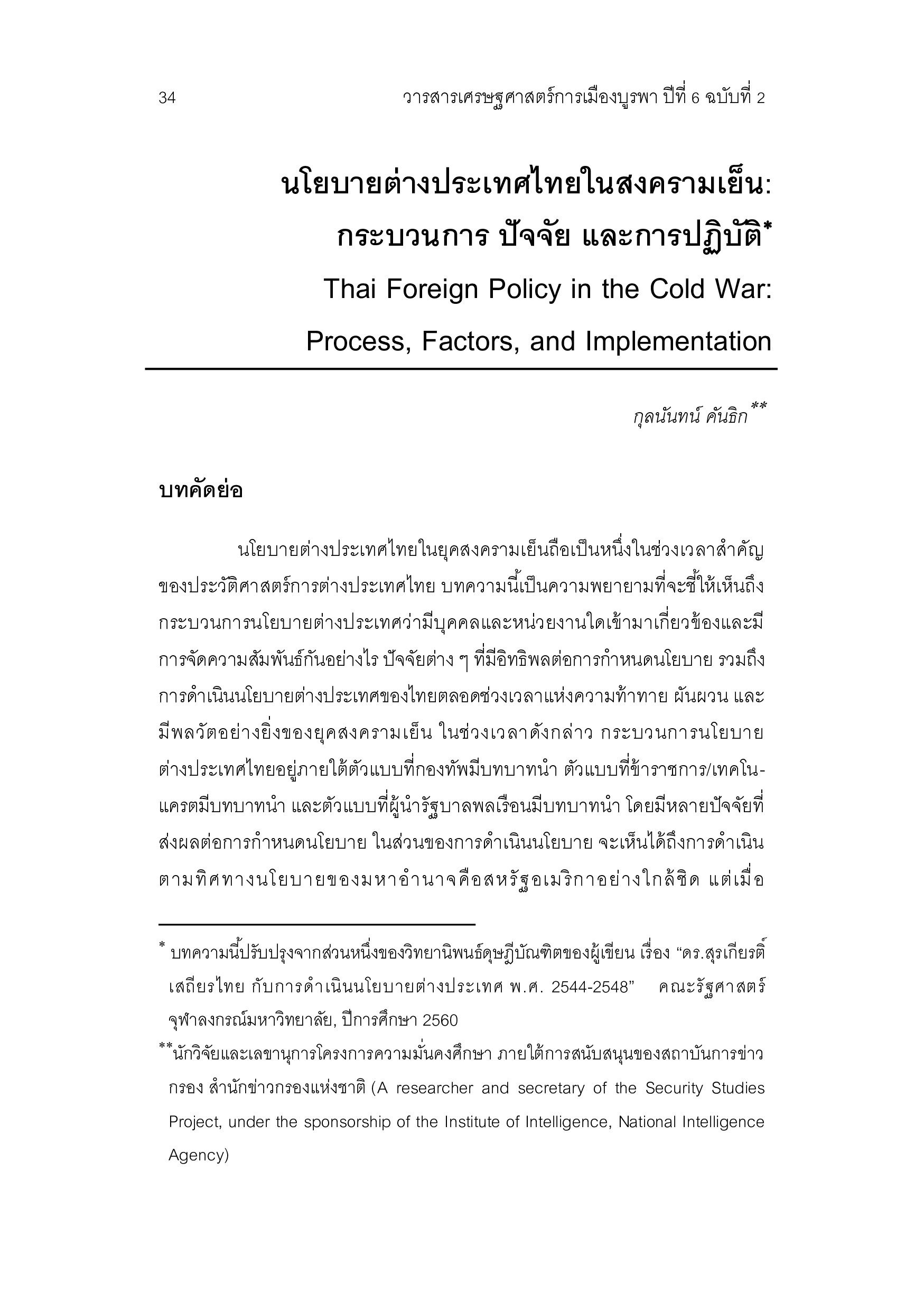Thai Foreign Policy in the Cold War: Process, Factors, and Implementation
Keywords:
Thai Foreign Policy, Policy Process, Policy Implementation, Cold WarAbstract
Thai foreign policy in the Cold War is one of the milestones of the history of the country’s foreign affairs. This article is an effort to indicate individuals and organizations that involve in the process and how they organize their relationship, the factors affecting foreign policy formulation and the implementation during the period of challenges, fluctuation and dynamism of the Cold War. During that time, Thai foreign policy processes are under the military-led model, the bureaucratic/technocratic-led model and the Prime Minister-led model while factors affecting foreign policy formulation are various. On the part of the implementation, Thailand executes foreign policy according to the United States’ policy orientation. However, once the external environment begins to change when the United States reduces its role in the region and the situation in Indochina, it is also a turning point in Thailand’s foreign policy. Importantly, the understanding of Thai foreign policy during the Cold War is the crucial point and the foundation to further study and understand the country’s foreign policy latterly.
References
เอกสารภาษาไทย
กุสุมา สนิทวงศ์ ณ อยุธยา. (2536). “นโยบายต่างประเทศของไทยหลังสงครามเย็น.” ใน ชัยโชค จุลศิริวงศ์ (บก.). 5 ทศวรรษการต่างประเทศของไทย: จากความขัดแย้งสู่ความร่วมมือ. (หน้า 223-231). กรุงเทพฯ: สำนักงานคณะกรรมการวัฒนธรรมแห่งชาติ.
เขียน ธีระวิทย์. (2519). “กระบวนการกำหนดนโยบายต่างประเทศของไทย.” ใน การเมืองและสังคม. กรุงเทพฯ: คณะรัฐศาสตร์ จุฬาลงกรณ์มหาวิทยาลัย.
จิติยา พฤกษาเมธานันท์. (2553). ประเทศไทยในยุทธศาสตร์ของสหรัฐอเมริกาต่อเอเชียอาคเนย์ในช่วงการเปลี่ยนแปลง (พ.ศ. 2516-2519). วิทยานิพนธ์รัฐศาสตรดุษฎีบัณฑิต, คณะรัฐศาสตร์, จุฬาลงกรณ์มหาวิทยาลัย.
จุลชีพ ชินวรรโณ. (2533). นโยบายต่างประเทศของไทยในทศวรรษที่ 1980: การย้อนพินิจ. กรุงเทพฯ: ศูนย์ศึกษาการต่างประเทศ วังสราญรมย์.
ชาติชาย ชุณหะวัณ. (2542). “ไทยกับโลกในทศวรรษ 1990.” ใน โคริน เฟื่องเกษม และคณะ. (บก.). รวมงานเขียนและปาฐกถา เรื่อง การต่างประเทศของไทยจากอดีตถึงปัจจุบัน เล่มที่ 2. (หน้า 6-10). กรุงเทพฯ: มหาวิทยาลัยธรรมศาสตร์.
แถมสุข นุ่มนนท์. (2536). “แถลงการณ์ร่วมถนัด-รัสก์ ค.ศ.1962.” ใน ชัยโชค จุลศิริวงศ์ (บก.). 5 ทศวรรษการต่างประเทศของไทย: จากความขัดแย้งสู่ความร่วมมือ. (หน้า 157-181). กรุงเทพฯ: สำนักงานคณะกรรมการวัฒนธรรมแห่งชาติ, ภาควิชาความสัมพันธ์ระหว่างประเทศ คณะรัฐศาสตร์ จุฬาลงกรณ์มหาวิทยาลัย.
ทีมข่าวการเมืองมติชน. (2549). ฉะ แฉ ฉาว นักการเมืองไทย. กรุงเทพฯ: มติชน.
ธำรงค์ ชินหิรัญ. (2536). ความล้มเหลวในการปฏิวัติของพรรคคอมมิวนิสต์แห่งประเทศไทย. วิทยานิพนธ์รัฐศาสตรมหาบัณฑิต, คณะรัฐศาสตร์, จุฬาลงกรณ์มหาวิทยาลัย.
นิตย์ พิบูลสงคราม. (2526). “สถานการณ์ระหว่างประเทศซึ่งส่งผลกระทบถึงประเทศไทย และการดำเนินการต่างประเทศ ตั้งแต่ ค.ศ. 1975.” ใน บทบาทของกระทรวงการต่างประเทศในด้านความมั่นคงและการพัฒนาเศรษฐกิจของประเทศ. กรุงเทพฯ: สถาบันการต่างประเทศ กระทรวงการต่างประเทศ.
พยัญชน์ เอี่ยมศิลป์. (2556). ภาวะผู้นำทหารกับการยุติการสู้รบบ้านร่มเกล้า. วิทยานิพนธ์รัฐศาสตรมหาบัณฑิต, คณะรัฐศาสตร์, จุฬาลงกรณ์มหาวิทยาลัย.
พระราชบัญญัติว่าด้วยคอมมิวนิสต์ พุทธศักราช 2476. ราชกิจจานุเบกษา. เล่ม 50 (2 เมษายน 2476).
พวงทอง ภวัครพันธุ์. (2561). การต่างประเทศไทยในยุคสงครามเย็น. กรุงเทพฯ: สำนักพิมพ์แห่งจุฬาลงกรณ์มหาวิทยาลัย.
พัชรินทร์ พิบูลสงคราม. (2558). นิตย์ พิบูลสงคราม ชีวิตและงานในวงการทูต พ.ศ. 2484-2557. กรุงเทพฯ: อมรินทร์พริ้นติ้งแอนด์พับลิชชิ่ง.
ภาสกร ศิริยะพันธุ์. (2524). “กัมพูชาทางออกหรือทางตันของเวียดนาม.” ใน เขียน ธีระวิทย์. (บก.). กัมพูชา. กรุงเทพฯ: สถาบันเอเชียศึกษา จุฬาลงกรณ์มหาวิทยาลัย.
มติชนสุดสัปดาห์. (2532). “สัมภาษณ์ : นายไกรศักดิ์ ชุณหะวัณ ที่ปรึกษานายกรัฐมนตรี.” ใน มติชนสุดสัปดาห์, 9(444): 22-24.
มอริสัน, ชาร์ลส์ อี และแอสตรี ซรูห์เก. (2523). ยุทธศาสตร์ของการคงอยู่: บทวิเคราะห์นโยบายต่างประเทศของไทยหลังสงครามโลกครั้งที่ 2 ถึงปัจจุบัน. พ.พนา. (ผู้แปล). กรุงเทพฯ: ดอกเห็ด.
วิชิต ญาณอมร และคณะ. (2556). ผ่านร้อน...ผ่านหนาว พล.อ.อ. สิทธิ เศวตศิลา. กรุงเทพฯ: บริษัท เอ อาร์ ไอพี จำกัด.
ศุภมิตร ปิติพัฒน์. (2547). การปรับตัวของกระทรวงการต่างประเทศในยุคโลกาภิวัตน์ : ศึกษากรณีโครงการนำร่องเอกอัครราชทูตแบบบูรณาการ. วิทยานิพนธ์รัฐศาสตรดุษฎีบัณฑิต, คณะรัฐศาสตร์, จุฬาลงกรณ์มหาวิทยาลัย.
สมพงศ์ ชูมาก. (2536). “การกำหนดนโยบายต่างประเทศของไทย.” ใน ชัยโชค จุลศิริวงศ์. (บก.). 5 ทศวรรษการต่างประเทศของไทย: จากความขัดแย้งสู่ความร่วมมือ. (หน้า 15-26). กรุงเทพฯ: สำนักงานคณะกรรมการวัฒนธรรมแห่งชาติ และคณะรัฐศาสตร์ จุฬาลงกรณ์มหาวิทยาลัย.
สำนักงานปลัดกระทรวงมหาดไทย. (ม.ป.ป.). กรอ.กลไกการขับเคลื่อนการพัฒนาประเทศ. เข้าถึงได้จาก http://www.jpp.moi.go.th/detail.php?section=1&id=80
สุชิน ตันติกุล. (2557). รัฐประหาร พ.ศ. 2490. กรุงเทพฯ: มติชน.
สุรชัย ศิริไกร. (2534). “บทบาทของผู้นำในการกำหนดนโยบายต่างประเทศ: การดำเนินนโยบายต่างประเทศของรัฐบาลชาติชาย ชุณหะวัณ ต่อปัญหากัมพูชา (9 สิงหาคม 1988-ธันวาคม 1989).” ใน สายทิพย์ สุคติพันธ์. (บก.). ปัญหาผู้นำกับกระบวนการกำหนดนโยบายแห่งชาติ. กรุงเทพฯ: มหาวิทยาลัยธรรมศาสตร์.
สุรชาติ บำรุงสุข. (2525). “อเมริกันมองไทย: ทัศนของสหรัฐต่อไทยในปี 1982.” วารสารสังคมศาสตร์, 19(4): 22-40.
____________. (2543). ทหารกับการเมืองไทยในศตวรรษหน้า: พัฒนาการและความเปลี่ยนแปลง. กรุงเทพฯ: สถาบันศึกษาความมั่นคงและนานาชาติ คณะรัฐศาสตร์ จุฬาลงกรณ์มหาวิทยาลัย.
สุรพงษ์ ชัยนาม. (2559). รายงานวิจัยฉบับสมบูรณ์ โครงการ “นโยบายต่างประเทศไทยต่อประเทศเพื่อนบ้านในยุคสงครามเย็น: ห้ากรณีศึกษาเปรียบเทียบ.” กรุงเทพฯ: สำนักงานกองทุนสนับสนุนการวิจัย.
เอกสารภาษาต่างประเทศ
Bamrungsuk, S. (1988). United States Foreign Policy and Thai Military Rule, 1947-1977. Bangkok: Duangkamol.
Bunbongkarn, S. (1988). “Domestic Political Change and Its Impact on Foreign Policy in Thailand.” in Scalapino, Sato, Wanandi & Han. (eds.). Asia and the Major Powers: Domestic Politics and Foreign Policy. Berkeley Institute of East Asian Studies, University of California.
Buszynski, L. (1989). “New Aspirations and Old Constraints in Thailand's Foreign Policy.” Asian Survey, 29(11): 1057-1072.
Cheow, E. T. C. (1986). “New Omnidirectional Overtures in Thai Foreign Policy.” Asian Survey, 26(7): 745-758.
Darling, F. C. (1967). “America and Thailand.” Asian Survey, 7(4): 213-225.
Fineman, D. (2009). “Phibun, the Cold War, and Thailand's Foreign Policy Revolution of 1950.” in Goscha & Ostermann. (eds.). Connecting Histories: Decolonization and the Cold War in Southeast Asia, 1945-1962. Washington, D.C.: Woodrow Wilson Center Press.
Gill, R. B. (1991). “China Looks to Thailand: Exporting Arms, Exporting Influence.” Asian Survey, 31(6): 526-539.
Haas, M. (1991). Genocide by Proxy: Cambodian Pawn on a Superpower Chessboard. New York: Preager.
Jayanama S. (2003). “Rethinking the Cold War and the American Empire.” Asian Review, 16: 1-44.
Jha, D. C. (1970). “Pakistan’s Foreign Policy: An Analytical Study.” The Indian Journal of Political Science, 31(2): 113-137.
Jiwalai, R. (1994). Thai Foreign Policy toward Laos, 1975-1990. Dissertation, University of Hawaii.
Kesboonchoo Mead, K. (2003). “A Revisionist History of Thai-US Relations.” Asian Review, 16: 45-67.
Kislenko, A. (2002). “Bending with the Wind: The Continuity and Flexibility of Thai Foreign Policy.” International Journal, 57(4): 537-561.
Ladavalya, B. (1980). Thailand’s Foreign Policy under Kukrit Prapoj: A Study in Decision-Making. Dissertation, Northern Illinois University.
Lerche, C. O. Jr. & Said, A. A. (1964). Concepts of International Politics. New Jersey: Englewood Cliffs.
Liang, C. S. (1977). Thailand’s Foreign Policy: An Analysis of Its Evolution since World War II. Singapore: Nanyang University.
Phuangkasem, C. (1984). Thailand’s Foreign Relations, 1964-80. Singapore: Institute Of Southeast Asian Studies.
Randolph, R. S. (1986). The United States and Thailand: Alliance Dynamics, 1950-1985. Berkeley: University of California.
Sarkesian, S. C., Williams, J. A. and Cimbala, S. J. (2013). US National Security: Policymakers, Processes, and Politics. (5th ed.). Boulder, CO: Lynne Rienner.
Viraphol, S. (1976). Directions in Thai Foreign Policy. Singapore: Institute of Southeast Asian Studies.
_______. (1985). “The Soviet Threat: Development of the Thai Perception.” Asian Affairs, 11(4): 61-70.
ข้อมูลจากการสัมภาษณ์
สรจักร เกษมสุวรรณ. (2561, 25 มกราคม). สัมภาษณ์
สุรพงษ์ ชัยนาม. (2559, 4 มีนาคม). สัมภาษณ์






